When I first started looking for the best ecommerce platforms, I was overwhelmed by the sheer number of options. Each platform seemed to offer something unique, but it was hard to determine which one would truly fit my business needs. In this guide, I’ll share my insights on the best ecommerce platforms, breaking down their features, benefits, and drawbacks.
My goal is to help you make an informed decision without the hassle of sifting through endless information. Let’s get straight to the point and find the right platform for your business.
In the quest for the best ecommerce platforms, clarity is vital. This guide provides an intelligent comparison of the leading platforms, unpacking the pivotal elements – from pricing and user experience to scalability and support. There is no filler, just the core information you need to match the right platform with your business’s needs and give you the dynamic nature of the ecommerce landscape in 2024.
Key Takeaways
-
- Best Ecommerce platforms enhance operational efficiency by offering key features such as inventory, payment processing, and marketing tools. However, selecting the right one necessitates alignment with business needs, technological adaptability, and superior customer experience.
-
- The best ecommerce platforms include open-source, SaaS, and hosted options, each with hosting arrangements, customizability, ease of use, and technical expertise requirements to manage and optimize online business operations.
-
- Critical considerations for choosing an ecommerce platform include an intuitive user interface, customization capabilities, security features like SSL certificates and secure payment gateways, comprehensive customer support, and scalability for business growth.
Understanding Ecommerce Platforms
Fundamentally, an e-commerce platform is software designed to assist businesses in establishing online stores and managing crucial operations like inventory control, payment transactions, and marketing activities. Its importance lies in its ability to drive operational efficiency while enhancing online product sales and payment processing capabilities.
When it comes to capabilities, ecommerce platforms come equipped with functionalities like:
-
- Marketing
-
- Inventory management
-
- Payment processing
-
- Omnichannel selling, enabling sales on multiple channels, including social media and marketplaces.
However, choosing the right ecommerce platform is a task that requires careful consideration. It is fundamental to choose an ecommerce platform that aligns with your specific business needs, consistently upgrades its technology, and ensures a superior ecommerce experience for your customers.
Types of Ecommerce Platforms
Ecommerce platforms can be categorized based on their hosting arrangements and management. They can include built-in hosting, self-hosting, or open-source hosting, depending on the needs of the ecommerce store.
For instance, open-source ecommerce platforms such as Adobe Commerce and WooCommerce are known for their high customization and flexibility, making them some of the best ecommerce options for creating an ecommerce website. However, they require technical knowledge and expertise, including search engine optimization (SEO) skills and marketing tools.
On the other hand, SaaS ecommerce platforms, like BigCommerce, operate on a rental model. This model simplifies managing an online business and makes it easier to sell online by eliminating significant complexity.
Hosted ecommerce platforms include website builders that include hosting in every plan, allowing businesses to avoid managing hosting themselves. In contrast, cloud-hosted ecommerce platforms utilize off-site solutions such as Amazon Web Services to host their customers’ stores, providing additional ecommerce features and scalability.
Key Features to Look for in an Ecommerce Platform
A few key features stand out when selecting the ideal ecommerce platform. One of these is an intuitive and user-friendly interface. Its importance is underscored by its ability to:
-
- Save time
-
- Avert technical issues
-
- Offer user-friendly navigation
-
- Provide a convenient dashboard
-
- Ensure mobile compatibility, aligning with the rising trend of mobile shopping.
Another essential aspect to consider is the level of customization and flexibility the platform offers. This is vital to molding the platform to fit your brand and business needs. Moreover, custom ecommerce functionality and backend programming are pivotal for optimizing business operations and gaining a competitive advantage.
Finally, a business owner must balance the importance of security features and payment options. Critical security features encompass SSL certificates, secure payment gateways, and PCI compliance. Additionally, it is important to prioritize a platform that provides a wide range of reliable payment options to ensure safe and convenient transactions for customers.
Top 12 Ecommerce Platforms for Different Business Sizes
To assist you in navigating through the plethora of ecommerce platforms, we compiled a list of the top 12 platforms, each catering to businesses of varying sizes and offering an array of features, from social media integration to robust security measures. Here’s a detailed overview of each one.
Shopify: Empowering Businesses of All Sizes

Shopify is an e-commerce platform that allows businesses of various sizes to sell online products. It is especially suitable for retailers in the initial stages of operation with annual revenue of up to $5 million while offering an enterprise-level solution, Shopify Plus, to accommodate larger businesses.
Renowned for its easily operated interface and versatility, Shopify continues to dominate the ecommerce landscape. With a vast app ecosystem and customizable themes, it caters to businesses of all sizes.
Shopify’s versatility is solely attributed to its comprehensive features, such as:
-
- Integration with multiple sales channels like Facebook, Instagram, and Amazon
-
- Inventory management for up to 1,000 locations
-
- A suite of over 4,000 apps for customization
-
- Integration with more than 100 payment gateways
-
- Shop Pay to enhance checkout speed
Regarding support and pricing, Shopify offers its users round-the-clock customer support through phone, email, live chat, and specialized support through Shopify Plus Academy. The pricing options include a starting price of $29 per month, a more economical Starter plan at $5 per month, and, for larger businesses, Shopify Plus starting at $2,000 per month.
Wix eCommerce: A Blend of Simplicity and Creativity
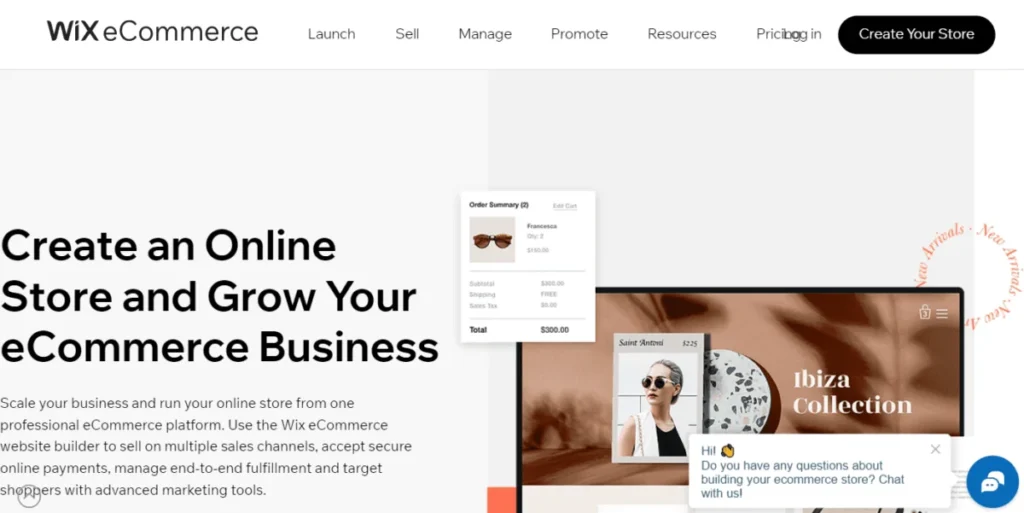
Wix eCommerce has evolved from being a website builder to a notable e-commerce platform. Its intuitive darg-and-drop interface appeals to those looking for simplicity without compromising functionality.
Wix is a user-friendly website builder that offers ecommerce capabilities. It is well-suited for:
-
- Small businesses in the services industry
-
- Particularly those in the health-related and women-focused sectors
-
- Startups
-
- Local businesses that offer services, subscriptions, and paid appointments
The benefits of Wix as an ecommerce platform encompass a comprehensive app marketplace, contemporary design templates, and self-hosting on their servers.
However, using Wix for ecommerce does come with some potential limitations. As it primarily functions as a website builder, it provides limited support, restrictions on storage, and API call limits, and it does not support merchants selling in bulk or wholesale.
BigCommerce: Streamlined for Growth
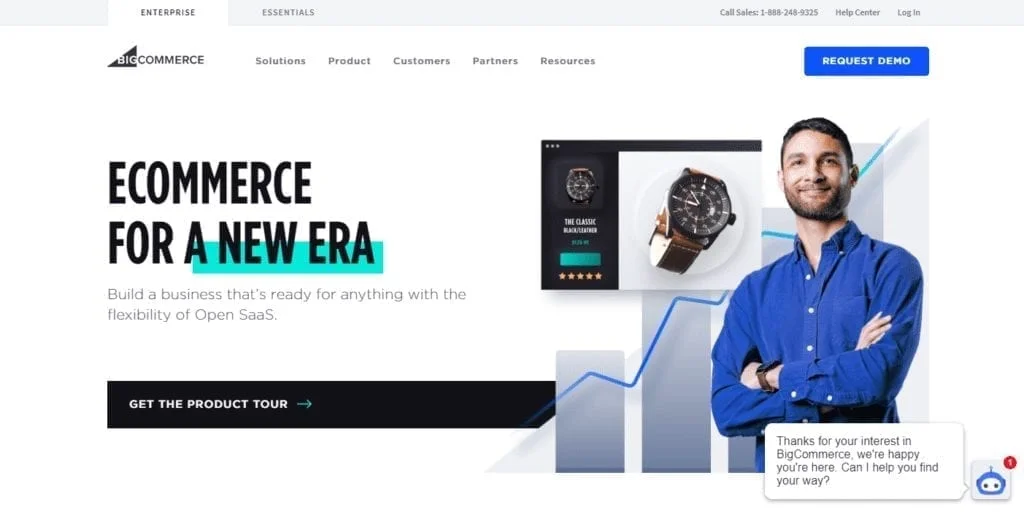
Known for its scalability and advanced features, BigCommerce is a cloud-based platform suitable for growing businesses. It offers a range of tools to enhance the overall shopping experience.
BigCommerce is an ecommerce platform tailored for larger businesses and those aiming for growth. It is particularly well-suited for companies with substantial product catalogs, as it can accommodate up to 600 SKUs per product, showcasing its capacity to manage a large volume of product offerings.
The pricing for BigCommerce starts at $29.95 per month for the standard plan and can go up to $299.95 per month for the pro plan, with enterprise-level options available upon request. If you plan to invest in BigCommerce, it is advisable to have a minimum budget of $100 per month. This will allow for steady investment and potential growth.
BigCommerce differentiates itself by:
-
- Providing no transaction fees across major payment providers
-
- Simplifying order management from multiple streams without additional apps
-
- We offer an industry-leading number of API calls per second with no cap for enterprise merchants.
WooCommerce: The Power of WordPress for Ecommerce

Built on WordPress, WooCommerce remains a powerful choice for those seeking flexibility and control over their online stores. Its open-source nature allows for extensive customization.
WooCommerce is a complimentary ecommerce plugin for WordPress, offered as an open-source solution. It is well-suited for businesses with established WordPress websites or seeking a cost-effective ecommerce option.
WooCommerce offers the benefit of being free to use and download and its seamless integration with WordPress. Additionally, it provides access to a sizable and expanding application and extension store.
However, WooCommerce may need help accommodating more extensive catalogs and businesses, offering a restricted range of templates and themes, and not providing round-the-clock live chat and phone support.
Squarespace: Elegant Design, Seamless Integration

Squarespace is a website builder with ecommerce capabilities, most suitable for creative professionals like photographers, artists, content creators, and high-end wellness or luxury brands, aiming for an aesthetically pleasing online representation.
Squarespace seamlessly integrates ecommerce capabilities into its visually stunning website builder. It’s an excellent choice for creative businesses looking to showcase their products with style.
The Squarespace e-commerce platform offers features like inventory tracking and the option to sell subscription products. It is recognized for its wide range of templates, a modern grid-based editing experience for precise design alignment, and a streamlined design process.
Regarding pricing, Squarespace’s Basic Commerce plan starts at \$27 per month when paid annually, and it includes hosting and 24/7 customer support through live chat and email tickets.
Adobe Commerce (formerly Magento): An Open-Source Giant
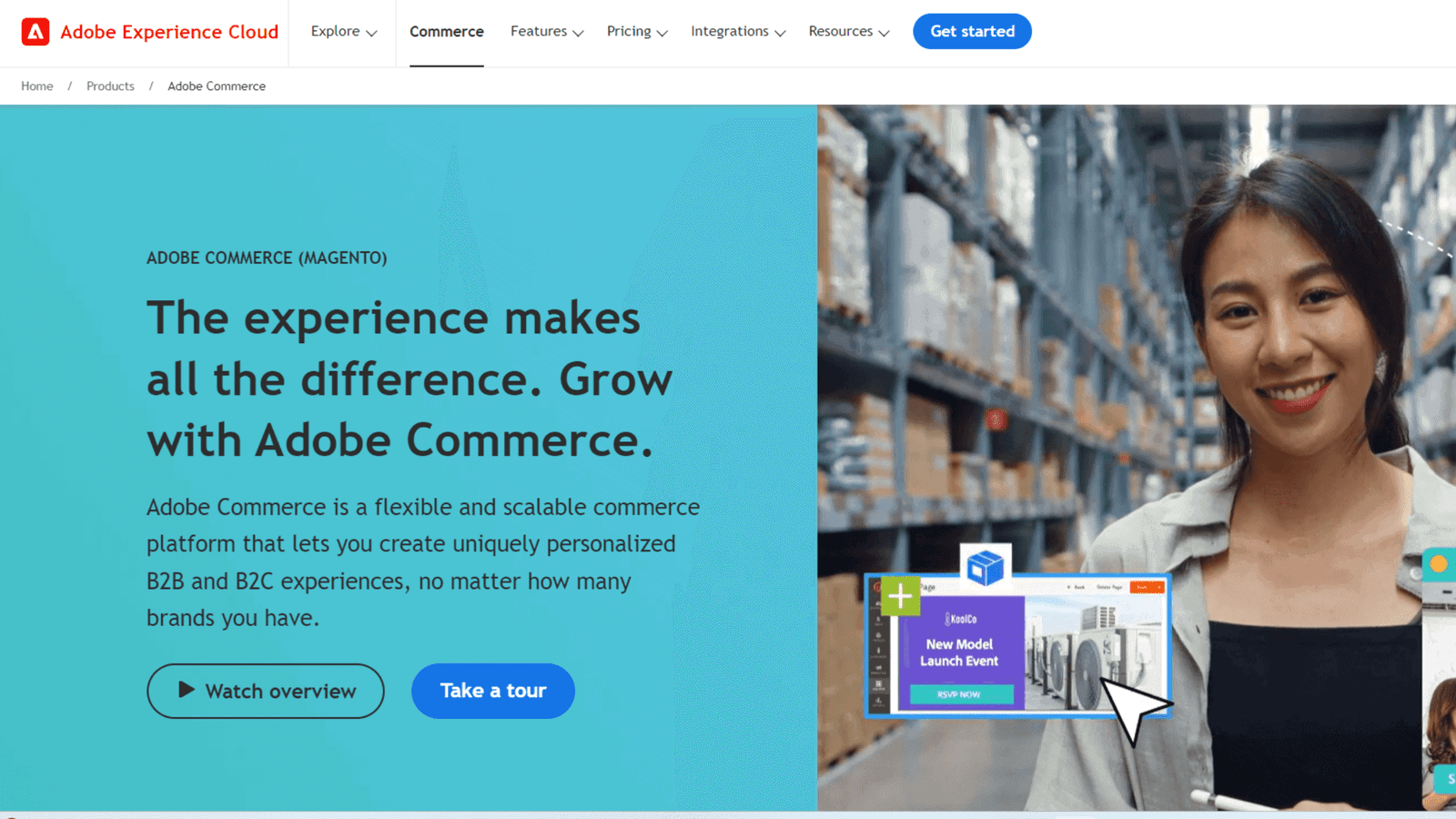
Adobe Commerce (formerly Magento) is a highly adaptable ecommerce solution primarily targeted at larger businesses and enterprises. Its customization and maintenance demands technical proficiency, making it potentially overwhelming for smaller firms to handle.
Ideal for large enterprises, the Adobe Commerce/Magento platform offers robust features and scalability. Its open-source edition and cloud-based solutions make it adaptable to various business sizes.
Adobe Commerce provides the following features:
-
- Pre-built integrations with Adobe software
-
- A wide array of extensions in its marketplace
-
- Progressive Web Applications (PWAs)
-
- Numerous resources, third-party software integration, and functionalities such as real-time inventory control, SEO, marketing automation, and multi-store capability
It is important to note that Adobe Commerce does not provide an integrated solution for mobile app features.
The pricing for Adobe Commerce is based on your sales volume. The Pro and Managed Services packages start at approximately $22,000 per year. Although Magento Open Source is free, additional hosting expenses, transaction fees, and purchasing plugins/extensions to enhance functionality may exist.
OpenCart: Lightweight and Efficient
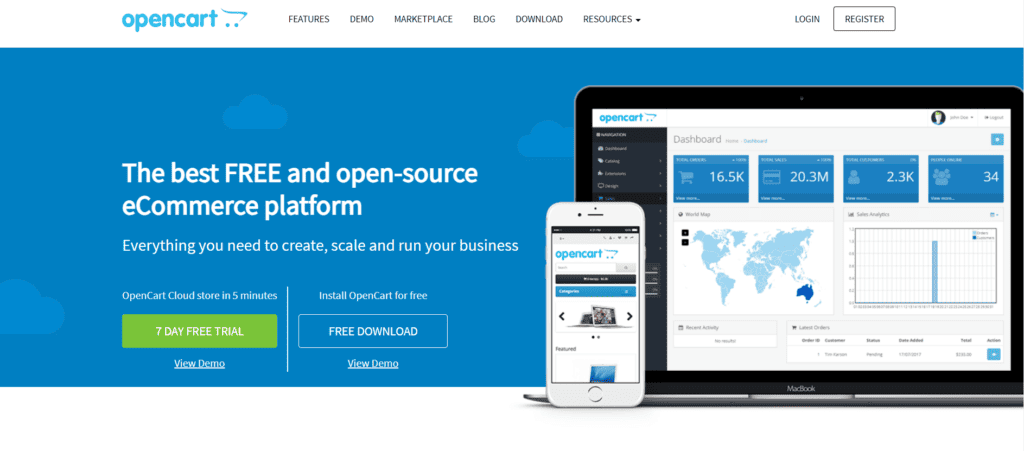
A lightweight, open-source platform, OpenCart is suitable for small businesses. Its simplicity and ease of use make it an attractive option for beginners.
OpenCart is a freely available ecommerce platform that enables users to:
-
- Establish and oversee multiple stores
-
- Access a wide array of themes and modules
-
- Benefit from a well-maintained development environment with comprehensive documentation
-
- Use a user-friendly administrative interface
-
- Join a robust user community.
OpenCart boasts a strong user satisfaction rating, achieving a commendable score of 4.3 out of 5 on G2.
However, there are drawbacks to using OpenCart. These include:
-
- The absence of integrated sales channels
-
- Varying mobile app capabilities
-
- The potential security risks associated with extensions and themes developed by inexperienced individuals.
Volusion: Tailored for Success

Volusion is an early SaaS ecommerce platform that offers:
-
- Straightforward and adaptable ecommerce solutions tailored for expansion
-
- Intelligent themes and aesthetically pleasing websites
-
- Effortless checkout experiences
-
- Video product recommendations
-
- Comprehensive shopping cart software
The pricing for Volusion includes the following:
-
- Starts at $31.50 per month when paid annually
-
- Tailored to meet the requirements of small to medium-sized businesses
-
- Provides robust built-in tools and SEO capabilities
-
- Competitive price point
However, Volusion is generally not perceived as user-friendly for ecommerce beginners. Nevertheless, it offers a 24/7 Help Center, a range of support articles, and additional phone support for technical assistance.
PrestaShop: Open-Source Excellence
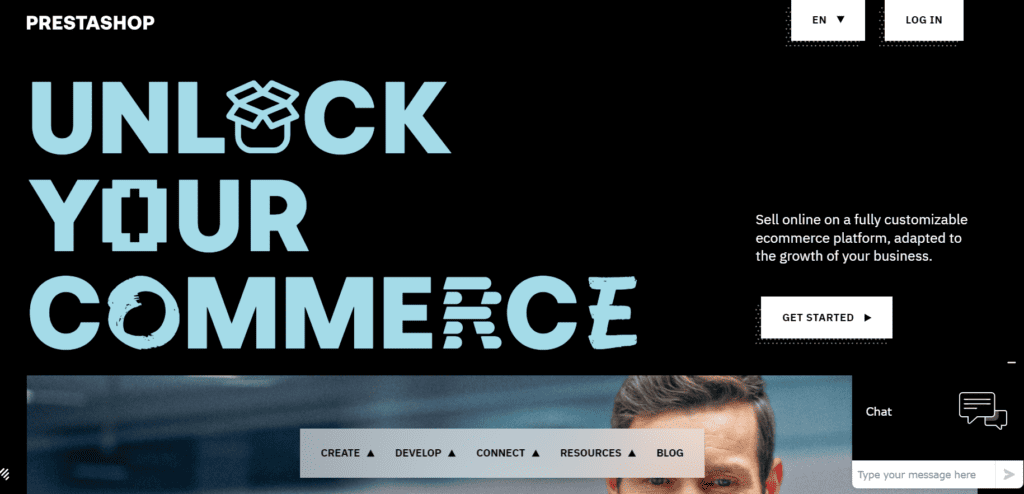
PrestaShop is an open-source ecommerce platform written in the PHP programming language. It offers various features and benefits, including:
-
- Ease of installation and usage
-
- Relatively straightforward customization
-
- Lower monthly cost compared to platforms such as Magento
-
- Reduced system requirements
PrestaShop also offers various paid add-ons and plugins to enhance its functionality. It’s favored by businesses looking for a cost-effective platform without sacrificing functionality.
However, the primary disadvantages of PrestaShop include a smaller set of out-of-the-box features compared to some competitors, limited SEO functions, and less comprehensive customer support.
Shift4Shop: Popular but not for beginners

Shift4Shop is a renowned e-commerce platform that provides a complimentary solution for setting up your online store. It is perfect for online shopping and has customizable features, SEO tracking, and many website templates.
Shift4Shop provides paid plans that start at $29 per month and include integration with sales channels such as eBay, Amazon, and Facebook.
Despite not offering a mobile application, Shift4Shop has received a G2 rating of 3.9 out of 5, indicating a predominantly favorable user experience.
Sellfy: Built-in print-on-demand Integration
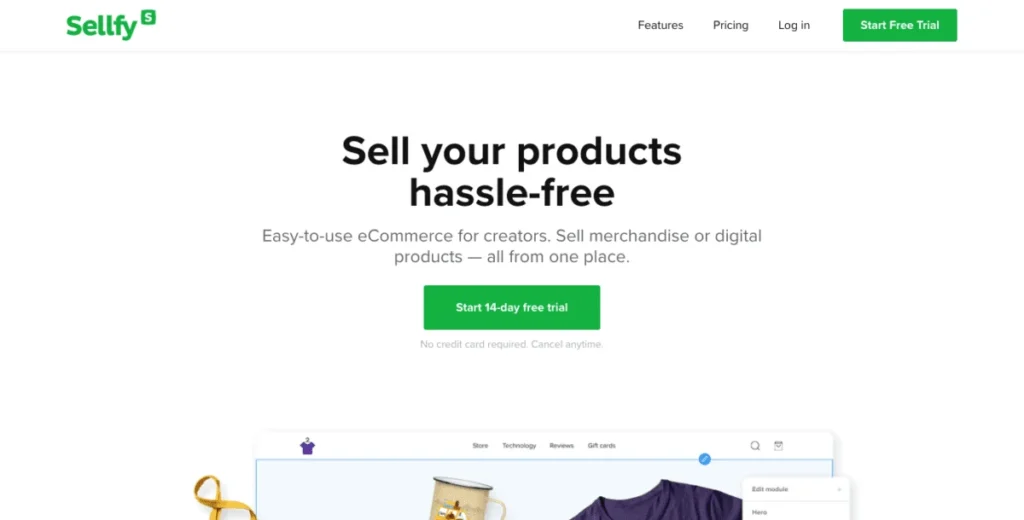
Sellfy is a simple and easy-to-use platform that works for various business models and includes a built-in print-on-demand integration. You can connect the platform to your existing website, build a Sellfy store with a custom domain, or use the Shopify Lite approach with “Buy Now” buttons and other embed options to make sales from other platforms.
Sellfy’s claim to fame is that you can get your store up and running within five minutes. While there are limits on the number and types of products you can sell on the Free plan, upgrading to a paid plan means you can sell unlimited, digital, and subscription products.
Weebly: A User-Friendly Option for Small Businesses
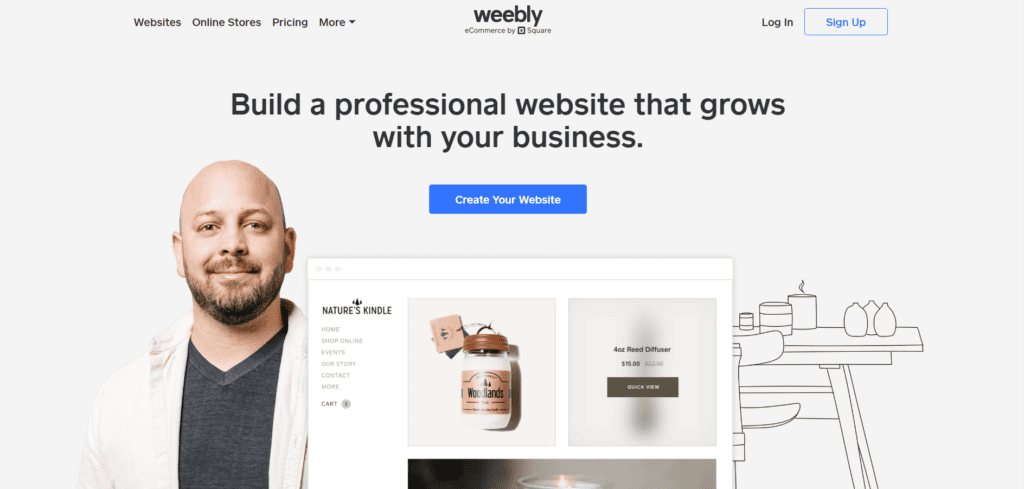
Weebly, known for its simplicity and ease of use, is an excellent choice for small businesses. Its intuitive website builder and integrated ecommerce features allow entrepreneurs to establish their online presence quickly.
Weebly is a website builder located out of San Francisco. With a user-friendly interface and easy setup, Weebly is designed for small business owners with limited web development experience.
In 2018, Weebly was purchased by Square, Inc. — a competitor in the ecommerce space.
Pricing Comparison of Ecommerce Platforms
Price plays a significant role in the selection of an ecommerce platform. The platforms have varying cost structures, including free options, monthly fees, and sales commissions. But it’s not just about the listed prices. Businesses should consider upfront and ongoing costs to align with their budget. One should note that the least expensive option may not always be the most strategic choice, as it may result in higher overall costs.
For instance, the pricing for different e-commerce platforms is as follows:
-
- Shopify: can cost between a Basic Plan at $39/month, a Shopify Plan at $105/month, and an Advanced Plan at $399/month.
-
- Wix: can cost between a Light Plan at $16/month, a Core Plan at $27/month, a Business Plan at $32/month, and a Business Elite Plan at $159/month.
-
- BigCommerce: can cost between a Standard Plan at $29/month, a Plus Plan at $79/month, and a Pro Plan at $299/month.
-
- WooCommerce: It can cost between an Essential Plan at $39/month and a Performance Plan at $70/month.
-
- Squarespace: can cost between a Personal Plan at $16/month, a Business Plan at $23/month, a Commerce Plan at $27/month, and a Commerce Advanced Plan at $49/month.
-
- Adobe Commerce/Magento: starting price of $22,000
-
- OpenCart: free to download and install. However, you must pay to host your site or if you want additional support features.
-
- Volusion: can cost between a Personal Plan at $35/month, a Professional Plan at $79/month, a Business Plan at $229/month, and a Prime Plan based on gross merchandise value (GMV)
-
- PrestaShop: free-to-use, open-source platform.
-
- Shift4Shop: starts as a free ecommerce platform and can cost \$29 per month
-
- Sellfy: Premium starts at $29/month, with the highest tier plan coming in at $159/month before annual discounts
-
- Weebly: It can cost between a personal plan for $6/month, a professional plan for $ 12/month, and a performance plan for $ 26/month.
Integration Capabilities and App Compatibility:
The seamless integration of platforms with other applications and services is vital for businesses. A wide range of integrations enables enterprises to choose the services they need to carry out their operations effectively.
To be considered robust in terms of capabilities, ecommerce platforms should easily integrate with other tools and systems such as CRM, ERP, and email marketing software.
App compatibility also holds significant importance for ecommerce platforms. Integrating apps and plugins can significantly enhance the functionality of an online business, automating various repetitive tasks.
Pros and Cons of the 12 Best Ecommerce Platforms
Selecting the best ecommerce platform depends on specific ecommerce business needs, technical expertise is essential, and budget considerations. It’s advisable to thoroughly evaluate each platform’s features and limitations before deciding on the best ecommerce platform for a thriving online venture in 2024.
The ongoing innovations in ecommerce platforms for 2024 present businesses with unprecedented opportunities to establish, enhance, and optimize their online store.
The key is to carefully evaluate the pros and cons of each platform, aligning them with the unique requirements and long-term goals of the ecommerce business.
| APPS | PROS | CONS |
| Shopify | -Efficient inventory management tools for ecommerce solutions -Built-in SEO features for improved search engine visibility -Marketing tools for increased promotion and customer engagement -Comprehensive analytics and reporting capabilities -24/7 dedicated customer support for your online store |
-Limited control over server infrastructure and data, as hosting is handled by Shopify for your own online store -Transaction fees for using external payment providers -For more advanced design or functionality changes, requires coding knowledge or the assistance of a developer -Dependency on apps and integrations from within the Shopify ecosystem |
| Wix | -Support for up to 50,000 products in your store catalog – more than many other platforms. -Conversion tools let you display product pricing in your customer’s local currency. -Integrated marketing tools, including email marketing, CRM, and social media management. -Free domain for up to 1 year for your online store. |
-Limited design flexibility compared to coding-based platforms. -Switching templates can be challenging, as it often requires rebuilding parts of your website. -App compatibility can vary, with limited integrations available on the Wix App Market. -A higher-priced tier is required to unlock the advanced developer platform. |
| BigCommerce | -Good for large catalogs with multiple variants due to Shopify restraints on the number of variants per product group. -Comprehensive analytics and reporting dashboard for tracking store performance and customer behavior. -Advanced marketing and conversion tools to boost sales and customer lifetime value. -Abandoned cart recovery, discount, and promotion creation. |
-Free forever plan – All plans come with a 14-day free trial, no credit card is required -Has a Wix integration -Multiple options for online selling -No transaction fees -Email marketing included in all paid plans |
| WooCommerce | -Integration with over 1,400 plugins and extensions, allowing for enhanced functionality and customization. -Active community support and knowledge center, providing access to resources, tutorials, and guidance. -Ample storage space for product images and media (up to 200 GB). -Greater ownership and control over data and intellectual property. |
-Requires a WordPress website. -Additional costs for domain registration and premium themes. -More responsibility for store maintenance, including core updates and plugin compatibility. -Failure to properly maintain your site can result in your site breaking and experiencing downtime. -Limited phone support. |
| Squarespace | -Lets you handle shipping, fulfillment, taxes, and payments all in one place. -Easily connects your store to Printful for customized merchandise sales without the headache of production and shipping logistics. -Can share updates directly through integrated social media channels. -Modern templates that can be edited directly within your browser. |
-All changes are published immediately after saving. -It is difficult to undo edits to your site. -Not ideal for websites that require an extensive menu hierarchy. -Be cautious of sluggish load times that can impact search engine rankings. |
| Adobe Commerce | -Pre-built integrations with Adobe software. -Offers thousands of extensions in its marketplace, ranging from $0 to $15,000. -Supports Progressive Web Applications (PWAs). |
-Lacks automatic features and version updates. -Has an extremely extensive setup, leading to high costs to complete builds. -The platform has a history of security breaches and vulnerabilities. |
| OpenCart | -Open source and accessible platform. -Extensive customization capabilities, allowing users to design their stores as they wish. -OpenCart Marketplace offers more than 13,000 modules and themes to use. |
-Limited free support plan. -Platform version updates are a manual process. -Merchants must host their store on their own server or a third-party server. |
| Volusion | -24/7 customer support is provided alongside a streamlined onboarding process. -Allows for third-party payment integrations. -A straightforward, intuitive dashboard allows for fast implementation as an ecommerce solution. |
-SSL certificates are an additional cost. -Lacks faceted search and product filtering options. -Blogging capabilities are only available via Element — a third-party API. |
| PrestaShop | -Free to install and use. -Highly customizable. -International capabilities. |
-Merchants need to install and manage patches themselves, including security. -Lack of included support staff in its initial package (must pay additional for dedicated support). -Steep learning curve, with more developer skills needed to succeed on own ecommerce website. |
| Shift4Shop | -Create and run your online store for free. -Fast and convenient end-to-end payment system. -24/7 customer support, including live chat, email and phone. |
-The free version of the store is available only for US customers. -Cannot process high-risk transactions. -Some sales channels integrations are only available via paid plans, including Amazon and eBay. |
| Sellfy | -Create and run your online store for free. -Fast and convenient end-to-end payment system. -24/7 customer support, including live chat, email, and phone. |
-Poor ratings for SEO -Limited options for payment gateways -Must use Zapier to facilitate most third-party integrations -Missing key marketing tools like 1-click upsells |
| Weebly | -Provides hosting for all of the websites built on their platform. -The drag-and-drop ecommerce website builder makes the process simple and streamlined. -Offers many built-in features, extension possibilities, and third-party integrations. |
-New accounts signing up for Weebly must use Square Online for ecommerce functionalities. -The level of customer support depends on the amount you pay. -Poor backup and restore system. |
Security and Data Protection
Security is of paramount importance when selecting an e-commerce platform. SSL certificates and two-factor authentication safeguard online transactions and user data.
PCI DSS compliance is also crucial as it guarantees the platform adheres to the security standards established to safeguard cardholder data throughout and following financial transactions.
Robust security features are essential in an ecommerce platform to protect sensitive customer data, ensure secure financial transactions, and establish customer confidence.
Customer Support and Resources
Reliable customer support is a must when selecting an ecommerce platform. After all, having a helping hand to guide you through technical challenges can be a lifesaver.
Different ecommerce platforms offer distinct support structures. Here are some examples:
-
- BigCommerce assists in transitioning from other platforms and assigns dedicated account managers.
-
- OpenCart benefits from a large community of support.
-
- WooCommerce provides customer support through various channels, including forums and email.
Ecommerce platforms should also provide essential self-help resources such as comprehensive tutorials and knowledge-base articles to enable users to autonomously address issues and better understand the platform’s features and best practices.
Scaling Your Business with the Right Ecommerce Platform
Choosing the right ecommerce platform is pivotal due to its far-reaching implications for scalable, long-term growth. It is crucial to consider future business plans when choosing an ecommerce platform to ensure that the platform can accommodate business growth and adapt to changing needs, ultimately leading to long-term success.
Indeed, it is feasible to transition to a different ecommerce platform; however, it is essential to note that the process can be intricate and potentially cause disruptions to business operations.
Making the Final Decision
Choosing the right ecommerce platform calls for careful thought and planning. It’s crucial to consider individual business requirements and scalability to ensure the best ecommerce platform can effectively manage increased traffic, product volume, and transaction demands as the business expands.
Pricing strategy also plays a role in the selection of an ecommerce platform. It can influence the perceived value of the platform, affordability for the business, and potential impact on profit margins.
Lastly, when selecting an e-commerce platform, a good business owner should prioritize security features as they protect customer financial information from unauthorized access. A robust security system is crucial for upholding customer trust and protecting data and privacy, which are essential for the sustained prosperity of an online store.
My Conclusion
In the rapidly evolving world of ecommerce, choosing the right platform is a critical decision that can set the stage for your business’s online success. From understanding the basics of ecommerce platforms to exploring the top 10 options available today, we’ve covered a lot of ground.
Remember, the best ecommerce platform is not a one-size-fits-all solution. It’s the one that fits your unique business needs and budget, integrates seamlessly with your existing software, accommodates your growth plans, and provides robust security and reliable customer support.
Keep in mind that an informed decision is the best decision. So, take your time, research, weigh your options, and choose wisely. After all, the success of your online business depends on it.
FAQ
Shopify is considered the best platform for eCommerce, offering a wide range of features and flexibilty to build your online store. Wix, BigCommerce, and WooCommerce also provide solid options for creating an eCommerce website.
It’s essential to consider factors for your ecommerce business, such as scalability, pricing, and features, when determining the profitability of an e-commerce platform. Shopify and WooCommerce are popular choices for their strong performance and flexibility.
An ecommerce platform is software that helps businesses create online stores, manage inventory, process payments, and conduct marketing activities. It is a comprehensive tool for running an ecommerce store effectively.
When choosing an ecommerce platform, prioritize an intuitive interface, customization options, and robust security features like SSL certificates and secure payment gateways for a reliable and secure online shopping experience.
When comparing the pricing of ecommerce platforms, it’s essential to consider both upfront and ongoing costs to ensure they align with your budget. Opting for the lowest-priced option may only sometimes be the most strategic choice and could result in higher overall expenses.



